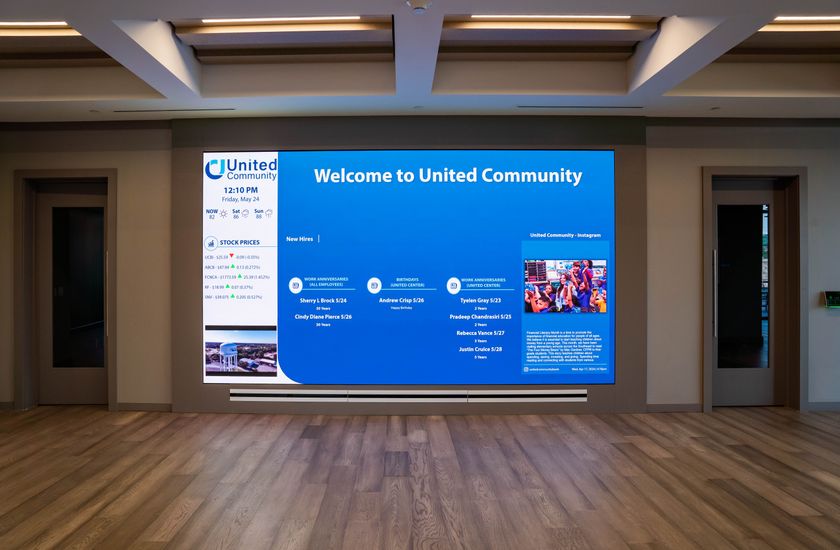- It's no surprise that houses of worship, just like facilities in every other market, must heed to budgetary restrictions when executing a new construction or retrofit. What makes them different, according to Sid Gattis, president of Gattis Pro Audio in Lexington, SC, is that just because churches must pay attention to numbers doesn't mean that projects are sold solely based on price.
Church committees are arguably the largest stumbling block in church projects-be sure to meet with them to determine what the church's goals are for the audio and video technology they intend to have installed.
"Most of the time, price is not an issue," Gattis said. "They are always looking for value, and they are willing to spend more money with a particular contractor if they feel like they are getting something more from them than they might be with the other people they are talking to." A solid partnership with an integrator that will support them long after the system has been installed is a top priority for clients in this market.
At Gattis Pro Audio, the bidding process begins with a lot of questions. Gattis and his team will sit down with the church committee, as well as the person in charge of the technical department, to determine what the church's goals are for the audio and video technology they intend to have installed. "We talk about what it is they are trying to accomplish, and we really try to gather a lot of details to make sure that we are on the right track," he explained. The company's preliminary proposal will detail the recommended equipment, the configuration and an explanation of the reasoning behind the system setup, what features the technology offers, and, of course, the cost. "We give them as much information as we can: in many cases, we will send spec sheets, pictures, and all sorts of visuals. It makes for a good presentation, even though half of these clients may not know what the specs really mean. At least they can put their hands on what it is they are potentially buying."
Once the church has expressed its concerns about the preliminary proposal, Gattis and his team will make the necessary revisions and present a second one, usually at a meeting involving, once again, the committee that is making the final purchasing decision, along with the head technical representative at the church.
Church committees are arguably the largest stumbling block in church projects, largely because many members may not understand AV technology. In some cases, the individual charged with overseeing technical operations isn't on the committee that is heading up the construction effort, making it difficult for integration firms to know who has final say on the systems they are proposing.
Pat Thompson, vice president of operations at TV Magic in San Diego, CA, notes that integrators can quickly lose control of a project if they haven't communicated properly with the committee. "It's really incumbent upon the integrator to somehow find a way to gain contact with the decision maker-whether that is a key committee member or a head pastor," he said. "This is the key to ensuring that you get a full chance of winning the job."
Ken Dickensheets, principal consultant at Dickensheets Design Associates in Austin, TX, describes dealing with church committees as an art form. "It takes good public relations, and you need to create a level of comfort with the committee so that they come to trust you and don't question every answer that you give them," he said, adding that his firm insists on conducting face-to-face meetings with church committees. "On the projects where we don't meet with the committees, there are always problems."
Getting face time isn't always easy, considering that pastors are overbooked and other key decision-makers might be reticent to commit to meetings focused on a topic with which they aren't familiar. When faced with this dilemma, Thompson persists on gaining access to these individuals, arguing that a quality system design requires the end user's input in order to be effective. "One thing you can do is bring up one or two key points that cannot be answered without the pastor's input," he said. "If the head pastor is making the decision on the facility, and you are asking how he normally conducts his service, and whether or not he wants on-stage control, and your technical contact is not sure, you can use that as a way to bring the pastor in." Not only has the integrator made contact with the person in charge; they've engaged them in the bid.
Gattis strives to get around this issue by hosting product demonstrations for technical personnel as well as the committees they are working with. "This is a great way of selling the technology, because if they can see it, hear it, and understand how it's working, they will vote us in every time," he said. "We have never lost a job where we were able to meet with the committee and do a product demonstration."
But demonstrations, or even regular, face-to-face meetings, are ineffective if the potential customers are turned off by too much techno-babble or slick sales methods. "You can't talk over their heads, and you can't be Johnny Salesguy; you need to be an integral part of the process," Gattis emphasized. "You need to make them understand that you are trying to do business, but you are also trying to make sure that what you are selling to them is what they are looking for."
Houses of worship, Gattis observes, prefer to deal with companies that have established a presence in the market, and who have proven that they have an intimate knowledge of how churches operate. "With most of the churches, if you are established in the community, and you have a lot of background in the church market and they can call other congregations for referrals, your foot is in the door," he said. "If you don't have that, a crow bar doesn't get you in the door some days, because you haven't been qualified."
Admittedly, this presents newcomers with a Catch 22. How can one begin to develop a presence in a market if it's not open to accepting new blood? "This means doing some small jobs and doing whatever you must in order to be successful," Gattis said, adding that this was the way he began his own company. "Take good care of your client so that when you go to see someone else who may be a bigger client, they have already heard that you take care of people."










